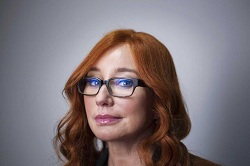|

songs | interviews | photos | tours | boots | press releases | timeline
Reuters (US)
October 25, 2012

Tori Amos puts new spin on old songs for "Gold Dust"
by Christine Kearney
(Reuters) - Tori Amos has been performing in bars and clubs since the age of 13, but the pianist-singer-songwriter's new tour and album mark 20 years since her breakthrough solo debut album "Little Earthquakes".
Throughout October, Amos, 49, has been touring with songs from her new album "Gold Dust", which reinterprets hits from the past two decades, accompanied by the Metropole Orchestra. The album, released October 2, follows her 2011 song cycle "Night of Hunters", also inspired by classical music.
Amos, a classically trained musician, talked to Reuters about "Gold Dust" and how she has forged new paths for American singer-songwriters.
Q. How difficult was it recording and touring with "Gold Dust" and playing with all these different orchestras?
A. "It's been a thrilling journey - I have had to really learn that an orchestra is an entity - it's a creature. I have been calling it the dragon and the conductor is the dragon tamer. And you just have to ... ride and don't let go and you will be fine.
"So it's a tango, it's pushing and pulling and answering each other and inspiring each other. And that's really where the love affair comes from 'Gold Dust.'
Q. Was it tricky to re-record and reinterpret old songs?
A. "I had to realize that you are going to look at songs that you might have known for the last 20 years. You also have to look at who they were when you first met them, and who they have become. So much of the songs on 'Gold Dust' now have a lineage because of other people's experiences, and people stopping me, having a conversation with me ... in a coffee shop or in an airport or at the stage door and telling me their experience with the song."
Q. Can you give an example of how the meaning of one song has changed for you 20 years later?
A. "Well 'Winter', when I wrote it, was very much from the viewpoint of going back to when I was a little girl, and running through the snow to catch up to my grandfather, or my father. ... But as I was recording this particular recording, I was seeing Natasha, my daughter, who was falling on the ice in Vienna when we were visiting the palace there and being tourists ... and her dad picked her up and wiped the tears away."
Q. You're known for being open with your views and experiences with religion, politics and sexual abuse. Twenty years on, do you regret being so open?
A. "I made a choice before 'Little Earthquakes' ... that I wouldn't walk on eggshells as far as subject matter, and that I was really motivated by women. ... I was motivated by secrets they keep, the stories that they hold close to their heart and possibly hide behind their eyes. And also, after they might tell me their story, they might talk to me about their emotional process. And it is humbling, intriguing, it opens my perception in ways that I never imagined it would over the last so many years."
Q. You've been hailed as very influential in shaping singer-songwriting after 'Little Earthquakes'. Do you think about that?
A. "I keep focused on the next project, I keep focused on the one I am doing and where I need to expand as a composer and taking information in, listening to people. Because in the listening is where so much of the learning happens. I don't choose to analyze what I have done and I think that is the right choice, because then I won't be spending my time creating."
Q. What are you interested in now? How is your musical "The Light Princess" in London coming along?
A. "Studying the great classical masters was a life-changing experience because I began to look at structures in a different way. 'The Light Princess' has been completely and totally rewritten than when it started and it's become a different project. ... I would not have composed in the way I have now for 'The Light Princess' if 'Night of Hunters' and 'Gold Dust' had not been in my life."
Q. So it seems you are feeling somewhat rejuvenated?
A. "Yes I would say that, I would say an infusion of a sonic palette has changed the way that I see music."
(Reporting By Christine Kearney, editing by Jill Serjeant and Richard Chang)
t o r i p h o r i a
tori amos digital archive
yessaid.com
|